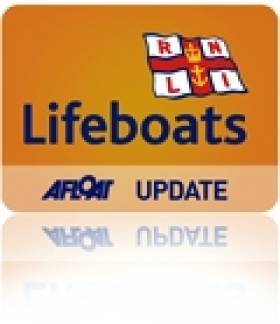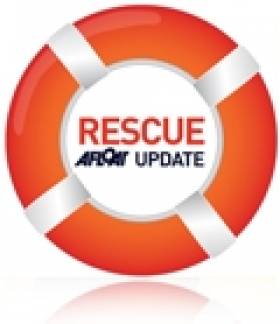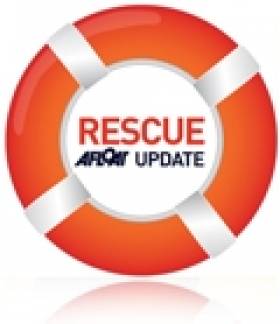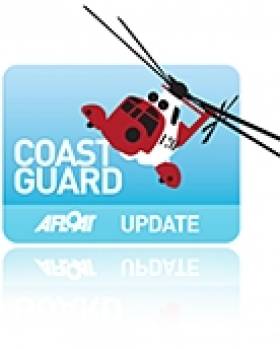Displaying items by tag: Kilkeel
Lifeboat Rescues Windsurfer In Stormy Conditions
#RNLI - Kilkeel RNLI rescued a windsurfer who got into difficulty in Carlingford, Co Louth yesterday (Tuesday 29 January).
The charity’s volunteer lifeboat crew was requested to launch by the Irish Coast Guard shortly after 2pm following a report that a windsurfer had got into difficulty in Carlingford Lough.
Launching their inshore lifeboat immediately, the crew encountered very unfavourable weather, with strong westerly winds of between force six and seven.
The lifeboat proceeded up the lough where they found and retrieved the windsurfer who had stayed by his board. The crew then attempted to retrieve the sail and board but couldn’t due to the windy weather conditions. They instead proceeded to tow the board into Greenore where the local coastguard took over.
Despite being in the water for approximately an hour, the casualty was described as being in reasonably good health.
Roy Teggarty, Kilkeel RNLI lifeboat operations manager, paid tribute to the lifeboat crew for their efforts in what was a challenging rescue:
"This was a day with difficult conditions because of the strong winds," he said. "It was mainly difficult to keep the lifeboat steady when retrieving the casualty so this rescue involved expert boat handling by all involved."
Body Recovered Off Dublin Thought to Be Missing Fisherman
#RESCUE - The Evening Herald reports that a body recovered 14km off the coast of north Dublin on Sunday is believed to be that of a missing fisherman.
The grisly find was made by the fishing vessel Rath Eilte in the waters off Skerries. A post-mortem was set to be carried out yesterday to determine the cause of death.
Found fully clothed in black and yellow oilskins, the remains are thought to be those of a Ukrainian in his 30s, a crewman on the Kilkeel-registered Zenith who was reported missing some 14.5km off Clogherhead in Co Louth on 29 January.
Search for Fisherman in Irish Sea Enters Second Day
#RESCUE - The Irish Times reports that the search has resumed for a fisherman who fell overboard from a trawler in the Irish Sea yesterday.
The crewman of the Kilkeel-registered fishing vessel Zenith was reported missing some nine miles (14.5km) off Clogherhead, Co Louth.
Yesterday afternoon the Irish Coast Guard and Clogherhead RNLI began an air and sea search and rescue effort, assisted by coastguard helicopter and other lifeboats and vessels in the area.
The Irish Times has more on the story HERE.
Flare Sightings Prompt Kilkeel Search
The first sightings of the red flares came in at 18.10 via 999 calls from members of the public reporting that they had seen the flares near the mouth of the Lough, southwest of Kilkeel. Belfast Coastguard issued a relay broadcast to vessels in the area to try and find more information about the potential vessel in distress, and three fishing vessels responded to say that they too had sighted the flares.
Belfast Coastguard then sent the South Down Coastguard Rescue Team, Kilkeel RNLI Inshore Lifeboat and the Irish Coast Guard Helicopter to the scene to begin a search. The three fishing vessels who responded to the initial broadcast also maintained a lookout during this time. The search area was approximately five and a half miles, and three miles offshore, and the search was completed at 20.30 and all resources stood down with nothing found.
Belfast Coastguard Watch Manager Rob Steventon said:
"With good visibility on scene and the search area completely saturated we are satisfied that the red flare sightings were not from a vessel in distress. All sightings of distress flares reported to the Coastguard have to be thoroughly investigated, however a proportion of these turn out to be either Chinese lanterns, or non distress situations, such as people disposing of out of date flares. Members of the public should be aware however, that using flares in a non-emergency situation is against the law."
Notes to Editors
Police Investigate Carlingford Boating Accident as Boy (6) Remains Critically Ill
It is understood another speedboat hit the youngster, leaving him with serious head injuries.
In a statement released on behalf of the Wilson family, Reverend David Somerville said:
"The family of Stuart Wilson, aged six years old, say that he remains critically ill. They would like to thank people for their support and prayers but appeal for privacy at this difficult time. They ask everyone to continue to pray for Stuart."
Stuart was given first aid on Cranfield Beach by a doctor and an off-duty nurse before being rushed to Daisy Hill hospital in Newry by ambulance.

































































